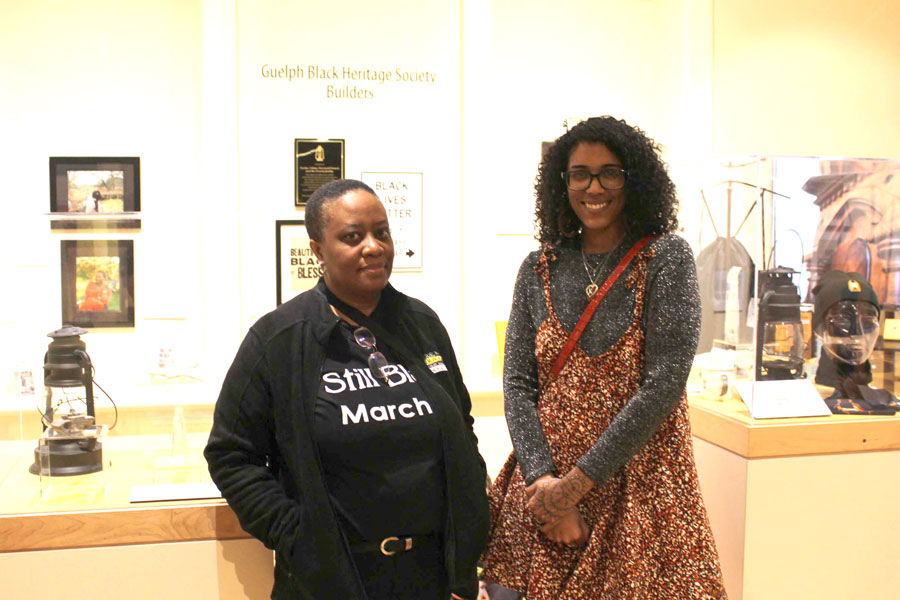ABOYNE – The Guelph Black Heritage Society (GBHS) celebrates Black Heritage Month with an exhibit at the Wellington County Museum and Archives.
The exhibit highlights local Black stories and recent community accomplishments and remains on display until July 9.
The opening reception on Feb. 4 included catering from Big Jerk and music from DJ Jinx and speeches from Denise Francis and Kween, who curated the exhibit.
Kween, the executive director and social justice initiatives coordinator at GBHS, said it was “really special” seeing people who have been part of GBHS’ journey visit the exhibit, and “really cool to see the history of everything all in one place instead of Denise’s brain.”
The GBHS is the only Black-owned and Black-focussed facility in Guelph and Wellington County, she noted.
The exhibit explains how GBHS formed in November 2011 to preserve the historical significance of the Heritage Hall by creating a cultural, historical and social centre in Guelph and Wellington County.
Formerly the Guelph British Methodist Episticopal church, Heritage Hall was “built by formerly enslaved Black individuals and their descendants who arrived in the area via the Underground Railroad,” states a plaque in the exhibit.
Heritage Hall is now a meeting space for community groups and hosts events like “cultural and educational programming, concerts, workshops and dramatic presentations,” thanks to the work of the GBHS.
Kween said the part of the exhibit that stands out to her is the flags on display, and the GBHS flag reminds her “how long, yet quick” their journey has been.
There are artifacts found during “Freedom Project” renovations in 2021, including pieces of a chamber pot and a small toy tank that is estimated to be almost 100 years old.
“The tank is so cool to see cleaned up,” Kween said with a laugh. “Denise found that in the rubbage of the Heritage Hall.”
There is a large screen in the exhibit showing videos of:
– the Black Lives Matter protest in June 2020, when thousands of people marched through Guelph, with speeches by Kween and other community members;
– the vigil at Heritage Hall on the first anniversary of the Guelph Black Lives Matter protest; and
– a tour of Heritage Hall after its Freedom Project renovations.
There are QR codes linking to five more videos of “stories, struggles, and triumphs” of local Black community members in the 1800s and early 1900s.
Francis, the president and treasurer of the GBHS, said the exhibit reminds her of what officials envisioned the “first day when we started the GBHS and we were sitting at [John Leacock’s] kitchen table,” and how far they’ve come since.
John Wesley Leacock is a founding member of the GBHS who is highlighted in the exhibit, along with Marva Wisdom, Kween and Francis.
Francis said she’s “had certain goals since the beginning and we’ve accomplished most of them,” noting that seeing the completed restorations after the Freedom Project in 2019 was monumental for her.
Those accomplishments took a lot of time, energy and sacrifices, “and it was tiring,” Francis said.
She said she is feeling bittersweet because “it’s kind of the end of this lifecycle for this journey.
“We are taking a new path” and asking “what does the future hold for us?”
Francis said life is a journey with cycles and stages, and “now that my list is done it’s time for me to move on.”
Kween, who announced on Dec. 16 that she will be stepping down from her role as GBHS executive director, said both her and Denise have been talking and reflecting “a lot on finding time for Black people to rest.”
They are working on “restructuring how much burden we place on ourselves between all the things we try to do for other people,” Kween said.
She said this year they are focusing on finding balance “between being able to educate our community without having to put too much responsibility on ourselves … and finding some rest and healing within all of the tribulations that have come over these last few years.”




